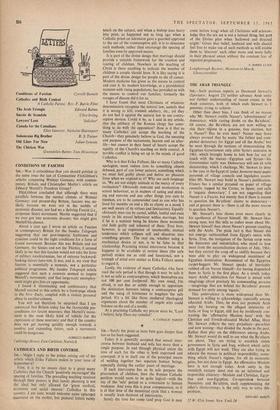CATHOLICS AND BIRTH CONTROL
SIR,—Might I reply to the points arising out of my article which Erika Fallaux makes in your issue of September 6?
First, it is by no means clear to a great many Catholics that the Church 'positively encourages' the spacing of families. The prevailing teaching received through their pastors is that family planning is not the ideal but only allowed for 'grave medical, economic and social reasons.' Catholics in this country, I am sure, would welcome some episcopal statement on the matter, but pastoral letters rarely touch on the subject, and when a bishop does hurry into print, as happened not so long ago when a Catholic priest on television gave a guarded approval to the use of the contraceptive pill, it is to denounce such methods, rather than encourage the spacing of families even by approved means.
It is part of the divine design that marriage should provide a suitable framework for the creation and rearing of children. Nowhere in the teaching of Christ is there anything to indicate the number of children a couple should have. It is like saying it is part of the divine design for people to die of cancer. Modern medicine has given us the means to control and cure it. So modern knowledge, at a providential moment with rising populations, has provided us with the means to control our families; formerly the ravages of disease did it for us.
I have found that most Christians of whatever denomination recognise the natural law, namely that it is wrong to kill, commit adultery, etc., yet they do not feel it against the natural law to use contra- ceptive devices. Could it be, as I said in my article, that the celibacy of the Roman clergy has some- thing to do with the opposition? How is it that so many Catholics can accept the teaching of the Church—they genuinely believe in God, the meaning and purpose of the sacraments, heaven and an after- life—but cannot in their heart of hearts accept the rigidity of the Church's teaching on birth control. A terrible conflict is being set up in the minds of good Catholics.
Why is it that Erika Fallaux, like so many Catholic apologists, must reduce love to something almost debased, part of our lower natures, something which we must feel guilty about and derive no pleasure from when we respond to it? Why use such language as, 'We are not simply animals at the mercy of every inclination'? Obviously restraint and moderation in sexual behaviour, as, in matters of eating and drink- ing and exercise and any other things you care to mention, are to be commended (and as one who has lived for months on end a life as chaste as a monk I am well aware of its virtues and limitations). Equally obviously man can be carnal, selfish, lustful and even
• randy in his sexual behaviour within marriage, but if he is a sentient being he knows these moments and feels guilty and ashamed of them. True love, however, is an expression of unutterable, mutual tenderness which eclipses self and dissolves into something greater. The real sin, whether using a mechanical device or not, is to be false to that relationship. Practising sexual intercourse because it happens to be available at certain times (the safe period) strikes me as cold and functional, not a triumph of mind over matter as Erika Fallaux seems to regard it.
Lastly, the evidence of -many Catholics who have used the safe period is that though it may be safe it is not so safe as contraceptives, which themselves are not 100 per cent foolproof. My own mind, I'm afraid, is not fine or subtle enough to appreciate the distinction between taking a contraceptive pill and the using of hormones to lengthen the safe period. It's a bit like those medieval theological arguments about the number of angels who could balance on the end of a needle.
As a practising Catholic my prayer must be, 'Lord I believe, help Thou my unbelief.'
A CATHOLIC PARENT






























 Previous page
Previous page